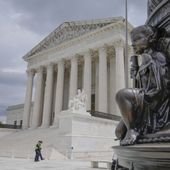Democratic presidential hopeful Tom Vilsack is going after potential 2008 contender Sen. John McCain, saying the Republican’s call to send more troops to Iraq is a mistake.
It’s an Iraq policy strategy other Democrats seeking the presidency have mostly avoided — instead, they are attacking President Bush or criticizing one another.
Mr. Vilsack, the outgoing governor of Iowa, is asking his supporters to petition Mr. McCain in protest of his support for increasing deployments to Iraq.
“We can’t afford to make a big mistake even bigger,” he said. “To me it’s very clear. Deploying more troops to Iraq is not an option.”
The debate over how best to handle the deteriorating situation in Iraq was sharpened this week with Mr. Bush considering a “surge” in troop levels, and highlights clear differences among those considering White House bids.
In his letter, Mr. Vilsack outlines the Bush proposal and urges his supporters to add their signatures to petition the Arizona senator.
“Senator McCain is clearly the Republican front-runner for 2008 and is his party’s leading authority on military matters,” Mr. Vilsack wrote. “His patriotism is admirable, but his position on sending more troops to Iraq is flat out wrong.”
McCain spokesman Craig Goldman declined to comment on the petition, saying the senator has been consistent in his Iraq position.
“He has called for more troops since the very start of the war and has never wavered from that,” Mr. Goldman said.
Mr. Vilsack, who did not have to cast a vote on the war, thinks the United States should move troops out of central and southern Iraq and keep a force in northern Iraq.
He says this will force Iraqis to take responsibility for their own security.
Senior Vilsack adviser Jeff Link said the governor is trying to adopt a profile that shows he can win the general election in 2008.
“For Democrats to win the general election, ultimately we [must] debate and have a point of view that is superior to the Republicans,” Mr. Link said.
Presumed Democratic front-runner Sen. Hillary Rodham Clinton of New York said this week that she opposes the Bush proposal to send 20,000 to 40,000 more troops to Iraq.
“I am not in favor of doing that unless it’s part of a larger plan,” the former first lady said on NBC’s “Today” show Monday.
“I am not in favor of sending more troops to continue what our men and women have been told to do with the government of Iraq pulling the rug out from under them when they actually go after some of the bad guys.”
Mrs. Clinton wants to create an oil trust that would allow each Iraqi to share annually in the country’s oil royalties.
She also said that if she knew then what she knows now, she would not have voted in October 2002 to authorize the use of force in Iraq.
She joins former Sen. John Edwards of North Carolina, the 2004 vice presidential nominee who last year wrote an editorial saying he regretted his vote for the war.
Sen. Barack Obama, the Illinois Democrat thought to be seriously considering a presidential run, was not a member of the Senate when that vote was held, and has opposed the war from its inception.
He favors establishing a flexible timetable for phased troop withdrawal.
Rep. Dennis J. Kucinich of Ohio is running for the nomination on an anti-war platform and says Democratic leaders should cut off all funding for the war.
Rep. Duncan Hunter of California, a Republican running for president, is skeptical of the troop-surge plan.
Mr. Hunter, the outgoing chairman of the House Armed Services Committee, said yesterday that he would rather rotate Iraqi troops — who are trained and equipped — out of the safer provinces and into Baghdad.
“Let’s send in the Iraqis first and see how much of this burden they can bear,” he said on CNN’s “Situation Room.”
The troop proposal is already an issue in Republican Sen. Norm Coleman’s 2008 re-election campaign.
The Minnesota senator, one of the Democrats’ top targets, told reporters after a trip to Iraq this week that he won’t support a troop increase, saying that sending more troops would “put more life at risk” and would not end sectarian violence, according to wire service reports.



Please read our comment policy before commenting.